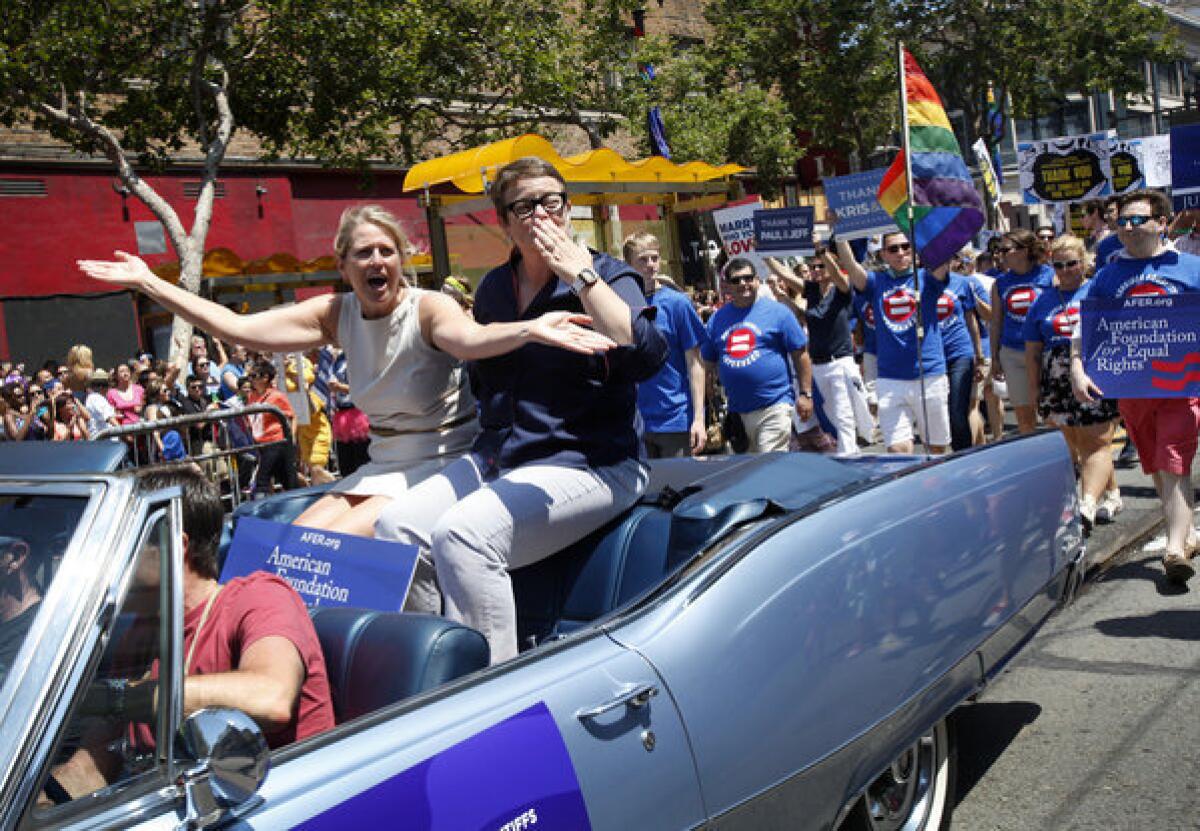How did same-sex weddings resume so quickly? Backers had a plan

SAN FRANCISCO — Same-sex weddings were able to resume less than two hours after a legal hold was lifted because challengers of Proposition 8 had planned for such an event, fearing their opponents might intervene and try to limit gay marriage in California, a lawyer for the challengers said Monday.
“Why take any chances,” said Theodore J. Boutrous Jr., a lawyer for the two gay couples who filed a federal lawsuit to invalidate the 2008 ballot measure. “We had Operation Marriage all set up for this moment.”
The surprise ruling by a three-judge panel of the U.S. 9th Circuit Court of Appeals on Friday afternoon and the quick marriages outraged the backers of Proposition 8, who contended that the court had acted prematurely in violation of a legal rule. A lawyer for ProtectMarriage, the group that sponsored the 2008 marriage ban, called the action “lawlessness.”
Ninth Circuit Chief Judge Alex Kozinski refused to discuss the case Monday but indicated that three-judge panels have discretion in such matters.
“It’s up to each panel,” said Kozinski, who was not on the panel that heard the Proposition 8 challenge. “I am not aware of any rule forbidding it.”
ProtectMarriage hasn’t ruled out another legal challenge, possibly in state court, though legal analysts doubt it would succeed.
The group said the trial judge’s order was limited to the two couples who sued because their lawsuit was not filed as a class action. They noted that 9th Circuit Judge Stephen Reinhardt, a liberal who wrote the panel’s decision overturning Proposition 8, had chided the gay rights lawyers in legal proceedings for failing to file the suit in a way that would ensure statewide enforcement.
Friday’s decision by Reinhardt and two other judges contained no dissent, even though the panel had divided 2 to 1 over Proposition 8’s constitutionality.
The Supreme Court ruled last week that the sponsors of Proposition 8 did not have the legal right to take the place of state officials in defending the measure on appeal. That ruling wiped out the 9th Circuit’s decision on the constitutionality of the marriage ban but left in place a 2010 decision by former Chief U.S. District Judge Vaughn R. Walker against Proposition 8. The 9th Circuit had placed Walker’s ruling on hold pending appeals.
Usually appeals courts wait for at least 25 days after a Supreme Court decision to take any action. The high court gives litigants that amount of time to ask for reconsideration. ProtectMarriage argued the 9th Circuit acted prematurely in violation of legal rules and tried unsuccessfully over the weekend to persuade the Supreme Court to stop the weddings.
The backers of the marriage ban cited a legal filing from the 9th Circuit that said its hold on Walker’s ruling would remain in place until a final decision in the case. A Supreme Court decision is not technically final until a certified copy is sent to the lower court. ProtectMarriage said the Supreme Court has not yet sent that to the 9th Circuit.
UC Davis Law Professor Vikram Amar said if ProtectMarraige was right, then the 9th Circuit’s action might have been “of questionable legality.”
But UC Irvine Law School Dean Erwin Chemerinsky disagreed, saying it would only have been problematic if the 9th Circuit issued an irreversible decision, such as one involving an execution or demolition of a building. Allowing marriages to proceed did not take way ProtectMarriage’s option to ask the Supreme Court for reconsideration, which is rarely granted, he said.
As soon as the 9th Circuit ruled, the two same-sex couples who filed the federal challenge headed out for marriage licenses. Several hundred couples have since married.
Boutrous said his legal team anticipated that the hold might be lifted Friday but did not know for sure. The court’s decision to act before the 25 days was not unprecedented, he said, citing a similar decision in 2009 in a case called Coeur Alaska, Inc. vs. Southeast Alaska Conservation Council.
ALSO:
30 L.A. firefighters lost in 1933 in Griffith Park blaze
LAFD crews battle ‘major emergency’ at Sun Valley warehouse
Two women drown after being swept out by high surf near Santa CruzTwitter: @mauradolan
maura.dolan@latimes.com
More to Read
Sign up for Essential California
The most important California stories and recommendations in your inbox every morning.
You may occasionally receive promotional content from the Los Angeles Times.










